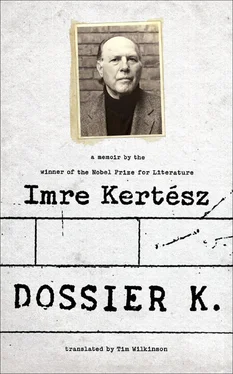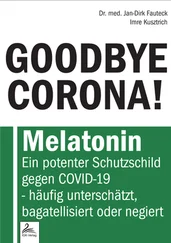I think I catch your drift. From the viewpoint of the end of the story, you have reached your goal and you were right .
Then there is no point in our continuing this discussion. That it is, so to say, over from a dramaturgical point of view; now let’s see what story comes of it.
Well … the story of a hard yet successful literary career .
Right then, let’s now look at how the success story and the life that I undertook to interpret relate to each other.
Obviously, the result of a first, superficial look will be absurd .
What do you understand by that notion, by “absurd”?
That what’s on the outside has little to do with what’s on the inside .
Or, in other words, the story to real life.
Nevertheless, there is something in common to the extent that your novels stem from your existence, and the result stems from your novels …
With the rider that those novels became detached from me earlier on, so they’re no longer the novels they were at the time of writing: hazardous, seemingly unrealizable enterprises.
Fine, but the jackpot still depends on the spin of the wheel at the roulette table, not on any decisions, struggles, or conflicts that the player may have undergone beforehand .
That’s not a bad simile. I would only draw your attention to the difficulties of narratability; it may be no chance that Homer was supposed to be a blind man. If we do not know what we are narrating, then we soon get to the incommensurable relation of existence and the seemingly achieved goals, where we have to abandon everything. Furthermore, this logical dead-end has been reached in the name of logic.
And if logic were to be suspended?
That still seems to be the most useful method. Then I can see my life as a series of now rational, now absurd struggles — stations that I am not permitted to thread onto the string of expediency because then I shall obtain a false result.
Despite that, you were led by goals; you must surely have set yourself a goal of some kind while you stepped from one station to the next .
Very likely, but then that’s a rule of life: a man lives with his face turned to the future, but that does not mean to say that he moves forward. I accept that we may be guided by notions of goals, but that is just an illusion: what we imagine to be the future is not as yet reality itself. It is not the future that lies in wait for us but the next moment, and anyone who thinks he is seeing beyond that moment is deceiving himself.
All of us live in this productive state of self-deception most of the time .
No doubt. And in the meantime lose sight of the ultimate goal.
I see too much Schopenhauer on your bookshelves .
Every great philosophy is a philosophy that serves to conquer the fear of death, but the truly great philosophies conquer the fear of death by accepting death.
Does the thought of suicide still occupy you?
It does, but in a different way than before, during the dictatorship, when it seemed to be the only alternative …
Would you care to finish the sentence?
Certainly: in face of the shame of continued survival.
Would it be right to say, then, that the comforting thought of suicide helped keep you alive?
A marvellous paradox! I never put it to myself in quite those terms.
Yet I was just going to ask you to what degree this incessant toying with the idea of suicide is serious, and if it is, then to what extent has it altered the prospect for you .
Are you asking about the sorts of techniques I have employed to play for time; what, in the final analysis, was my method for surviving; or to put it another way, what did I use, and how, to deceive myself? If I were to say that I always wanted to die, and instead of that I always wrote a book — that would be an elegant cop-out, wouldn’t it?
I would make do with it if I were to read it in a book by an aphorist like Cioran, but with you I’m expecting a genuine response .
I’m not sure that if some less brutal means had been lying to hand, morphine, let’s say, or some other reliable poison … well, I’m not sure whether, on one or two occasions, my life might have been in serious jeopardy. In a western democracy I would not have come to know those moods of despair on which my heuristics fed. On the other hand, the other day, while organizing the notes that I made for Liquidation , I came across a slip of paper … hang on a second, I’ll find it in a moment … here it is. “Those years once more, the depressing dictatorship mood, happy deliberations of suicide, the whole death-game of the Seventies and Eighties …”
I see what you mean: a bit morbid, but fathomable. The discreet charms of the dictatorship … Did you ever talk about such things with Albina?
No, no way! We had other things to do: one had to live.
Could she not have found a better, easier occupation for herself than working as a waitress?
No. I mentioned, didn’t I, that her first husband had been put to use in one of the show trials, and the sentence he received included confiscation of all his property? Albina was obliged to leave their big middle-class home straight away and urgently sort out a means of livelihood. She had acquired no profession, but she did have a driving licence, which meant that she managed to obtain a job as a truck driver with TEFU, the state haulage company. She worked alongside other, likewise “déclassé elements” as well as a few genuine professional truck drivers in handling what counted as the almost punitive business of making the dawn deliveries of vegetables and milk, which amounted to stopping each and every time for the produce to be unloaded in front of the shops. She made a fairly conspicuous figure with her long, lacquered fingernails from her previous mode of life, not to say the Alsatian dog that she took along with her on the trips because there was nobody with whom the animal could be left. The dog would obligingly leap up onto the back of the truck, but once it was up there it would also “guard” the truck, so the loading workers wouldn’t dare go near it.
I can just picture the bizarre scene .
Not long after we had got together she found herself a job with what was called the Restaurant and Buffet Company. In those days that was a major privilege; the firm was managed by a former footballer called Lajos Ónodi, who collected a whole flock of déclassé persons who had been dislodged from their old ways of life. There was a dishwasher who had been a countess and a baroness who had been promoted to cocktail waitress, a football player’s wife whose husband had left her — take your pick. Albina was given a job as a waitress in the Abbázia [Opatija] Restaurant which used to be by the Oktogon.
While in the meantime you sat at home reading Schopenhauer .
One could put it like that.
Did you, in all honesty, read right through all four of the hefty volumes of the Hungarian edition?
Of Parerga and Paralipomena , you mean? I certainly did; indeed, for a time it was a constant reading-matter, and that had the abiding merit that it led me on to Kant.
Another of the books that you had need of and that sure enough, found their way into your hands?
Exactly. To the best of my recollection, a new Hungarian translation of the Critique of Pure Reason was published in the Sixties. I bought it, but it lay around unread for who knows how long. It was just as much a mystery why I packed it in the suitcase when Albina and I went down to Balatonalmádi one summer. Brilliant July sunshine gave way to days of rain. One could step out of the room that we had rented onto a covered wooden balcony. I dipped into the book and then couldn’t put it down. I read it the same way that I had read Agatha Christie’s detective stories when I was young. It was further reinforced by the fact, which I had long suspected anyway, that the world is not “an objective reality independent of us,” as the Marxists would harp on, but quite the opposite: it exists only as long as I exist, and it only exists in the manner in which I can imagine it: in the midst of the conditions of space and time and causal relations that are given to me.
Читать дальше












